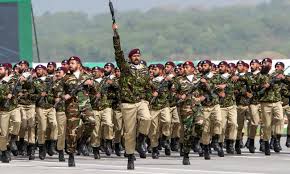Author Recent Posts Abid Kakar Latest posts by Abid Kakar (see all) Trump and Trade War 2.0: Implications for US-China Relations – December 17, 2024 Are Tariff Wars Coming? – December 5, 2024 Legality of Israel’s preemptive strike and Self-Defence in the light of international law – October 30, 2024
There has been much discussion and disagreement on whether Israel’s preemptive strikes and claims of self-defense are permitted under international law. The interpretation of the UN Charter, customary international law, and particular geographical circumstances that make the application of these legal frameworks more difficult are the main guiding principles of these acts. The dispute revolves around Article 51 of the UN Charter, which recognizes the intrinsic right to self-defense against an armed attack. This clause has been interpreted in a number of ways, especially in relation to the definition of “armed attack” and the proportionality and timing of self-defense tactics. Under the pretext of self-defense, Israel has frequently defended its military actions, including preemptive strikes, by asserting that they are required to shield its citizens from immediate threats from hostile actors, especially those operating in the Gaza Strip and other nearby territories.
In international law, the idea of preemptive self-defense is debatable. Though Israel contends that the changing nature of modern warfare, especially with non-state actors, necessitates a broader definition of what constitutes an urgent threat, traditional interpretations place emphasis on the necessity of an immediate threat. This position is best shown by the Israeli operation against a prominent Hamas leader in 2002, in which Israel asserted the need to take action before an expected attack could take place. Critics contend that such preventive measures go against the need standard set forth in international humanitarian law as well as the proportionality principle. Making the line between preventive and preemptive self-defense is one of the discourse’s crucial points. While preemptive activities are appropriate when there is an immediate threat that requires an urgent response, preventive actions are conducted to thwart possible risks that may occur in the future. Because preventive strikes go against the fundamental principles of state sovereignty and non-interference, many legal academics argue that they are illegal under international law. Concerns are raised by Israel’s dependence on preventive measures because of the possibility of abuse and the precedent it creates for other governments to use the pretext of national security to defend comparable actions.
The international community’s reaction has been mixed, with some nations endorsing Israel’s right to self-defense, especially in light of its complicated security situation and past history of violence from nearby regions. For example, the United States has frequently supported Israel’s actions because it believes they are justifiable countermeasures against terrorism. On the other hand, a number of countries and international institutions, such as the United Nations, have denounced specific Israeli military actions as being excessive and indiscriminate, raising issues with regard to the impact on human rights and civilian casualties. An additional level of intricacy is introduced by the concept of “occupied territories.” Occupying powers are specifically obligated to protect civilians and uphold their rights under international law, especially the Fourth Geneva Convention. These legal frameworks are frequently used to examine Israel’s military operations in Palestinian territory. Critics contend that preemptive strikes in these situations worsen the humanitarian situation that residents in these regions are facing in addition to breaking the international humanitarian law norms of proportionality and distinction. The difficulty is in striking a balance between the duty to protect civilian populations, which is a cornerstone of international humanitarian law, and the right to self-defense.
Furthermore, the idea of state sovereignty is crucial to this discussion. Except in situations of self-defense or with the UN Security Council’s approval, governments are normally forbidden by international law from employing force against one another. It is possible to see Israel’s preemptive strikes as an infringement on other governments’ sovereignty, especially when they go beyond its boundaries. In circumstances where a state’s conduct can be interpreted as aggressive rather than defensive, this calls into question the legitimacy of utilizing military force.
Conflicts are becoming more complex due to their changing character, especially with the emergence of non-state players and asymmetric warfare. The difficulties of using conventional legal frameworks in modern conflicts are demonstrated by Israel’s interactions with organizations such as Hamas and Hezbollah. The nature of these conflicts frequently makes it difficult to distinguish between fighters and non-combatants, which raises serious moral and legal issues. Due to the potential for accidental civilian casualties, the growing use of technology in combat, such as drone strikes, significantly complicates the legitimacy and accountability of military operations and raises concerns about compliance with international law.
In the end, the debate over Israel’s claims of self-defense and preemptive strikes mirrors larger conflicts in international law over state conduct, security, and human rights. The moral and legal ramifications of Israel’s conduct cannot be ignored, even while it claims that its activities are justified by an inalienable right to self-defense in a volatile security situation. Maintaining international legal norms while maintaining national security is still a difficult and developing topic of discussion. The ability of the international community to handle the difficulties presented by non-state actors, the effects of military technology improvements, and the ongoing search for a fair and sustainable solution to the Israeli-Palestinian issue will probably determine how this conversation develops in the future. The interaction of politics, morality, and the law will continue to be central to debates about self-defense and the justification of military operations on a worldwide scale as this complicated scenario develops.
- Trump and Trade War 2.0: Implications for US-China Relations - December 17, 2024
- Are Tariff Wars Coming? - December 5, 2024
- Legality of Israel’s preemptive strike and Self-Defence in the light of international law - October 30, 2024






















Leave a Comment
Your email address will not be published. Required fields are marked with *